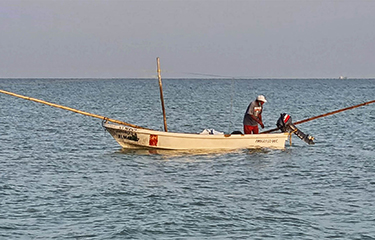Many fisheries, especially those that are artisanal or small-scale, experience barriers to attaining certifications and ensuring long-term prosperity, but fishery improvement projects (FIPs) can provide the push these fisheries need to hurdle the obstacles in their path – such as difficulty securing resources and capital, achieving proper capacity, and streamlining the safe processing and efficient transport of seafood resources.
The Yucatan octopus FIP, launched in 2019 on the east coast of Mexico, is one such example of a project working to align a fishery – which is an important source of income not only for individual fishers but Mexico as a whole – with requirements that the market has in place to verify that products are sustainable.
“This fishery is positioned in seventh place in the country’s fishery production and in fourth place for its economic value,” said Lorena Rocha, a curator with Comunidad y Bioversidad (COBI), a Mexican nonprofit which works to encourage current and future generations of fishers to engage in knowledge-sharing to codesign and implement solutions that establish resilient communities and healthy oceans. “During the last 10 years, the Yucatan state has been the largest producer of octopus in the country, reporting a total catch of 36,965 [metric] tons, which represents 65 percent [of the country’s output]. [It] generates 15,000 jobs and a commercial value of more than 27 million USD [EUR 25.6 million] per year."
Fishers harvest two octopus species under the FIP: octopus maya and common octopus. There are eight fishing cooperatives participating in the FIP, representing communities in the western part of the Yucatan Peninsula and harvesting approximately 3,603 metric tons (MT) of octopus from a fleet of around 200 medium and small boats. The fishery uses a fairly low-impact method of drifting rods and bait to reel in catch.
The Mexican government fisheries research agency (INAPESCA) is also a participant in the FIP and actively working to improve the fishery. Because of the export value of the fishery, there is already a harvest strategy in place that includes monitoring, stock assessment, and harvest control rules, making it somewhat of an anomaly among Mexican fisheries where limited resources, data, and capacity have resulted in many fisheries lacking proper management and oversight.
“There are four principal management tools used by the fishing organizations in the fishery,” Rocha said. “The first is a yearly quota that is set by the government fishery management agency [CONAPESCA] at the start of the fishing season; the second is a minimum catch size, as the mantle of the octopus must be 11 centimeters; the third is the fishing gear that is done with a fishing rod … [and] lines with live bait; and the fourth is a closure of the season from 16 December to 31 July of each year in [the regions of] Campeche, Yucatan, and Quintana Roo.”
Still, having a management plan does not ensure effective implementation and enforcement of the plan, so the efforts of the FIP aim to complement the existing efforts from the government.
“Before the FIP, a yearly quota was in place, but now the FIP promotes … [and supports] the setting, implementation, and enforcement of the quota,” Rocha said.
A recent review of the FIP carried out by Ocean Outcomes articulated just how important this supplementary role is to the future of the fishery.
“Thus far, the FIP has largely focused on efforts that the fishing community can lead and participate in,” the report stated. “Along with these efforts, there is a need to continue strengthening fisheries policy and developing management regulations that can be practically implemented and enforced. Continued collaboration among scientific experts, managers, and the fishing community can help address such challenges.”
This government-backed collaboration is especially important for FIPs that have the ultimate goal of achieving MSC certification, like the Yucatan FIP does, that usually comes at the request of supply chain partners.
Rocha said meeting these standards in artisanal fisheries requires deeper engagement from participants.
“We started with 4 percent of the fishery represented in the FIP in 2021, and now, we have more than 12 percent; we want to continue to increase that percentage,” she said. “We also [want] to increase the investment of the private sector for social and environmental improvements and increase the number of supply chain companies engaged, but we do not want to create more leverage and pressure without a clear understanding of what needs to be done to make real improvements. We want partners committed to strategic change on the water and in the community – not just on a piece of paper.”
Along with working toward MSC certification, the FIP also participated in FisheryProgress’s Human Rights and Social Responsibility (HRSR) Policy Early Adopter Program.
FisheryProgress Program Manager Jeremy Rude echoed Rocha’s sentiments, and said there is a similar need for supply chain companies to be more strategic in how they participate in FIPs and how they assess these projects’ impact and progress.
“FIPs are best positioned to address human rights risks when buyers stay engaged to support needed improvements,” Rude said. “Publicly committing to sourcing from FIPs that report on FisheryProgress and that demonstrate progress toward meeting HRSR policy requirements is one of the first steps. Businesses also have a role in actively monitoring and engaging with FIPs to help ensure they comply with the HRSR policy and support their progress and changes on the water. This may include providing financial support for FIP improvement activities and assessments, such as social risk assessments and the implementation of a social workplan to address challenges.”
The supply chain companies working with the FIP include Netuno USA, LP Foods, Orca Seafoods, Del Pacifico Seafoods, and Pacific Ocean Harvest, among others.
Photo courtesy of the Marine Stewardship Council







